Unit 3 Could you please clean your room-Section A 3a Reading课文知识点串讲课件(共12张PPT)
文档属性
| 名称 | Unit 3 Could you please clean your room-Section A 3a Reading课文知识点串讲课件(共12张PPT) | 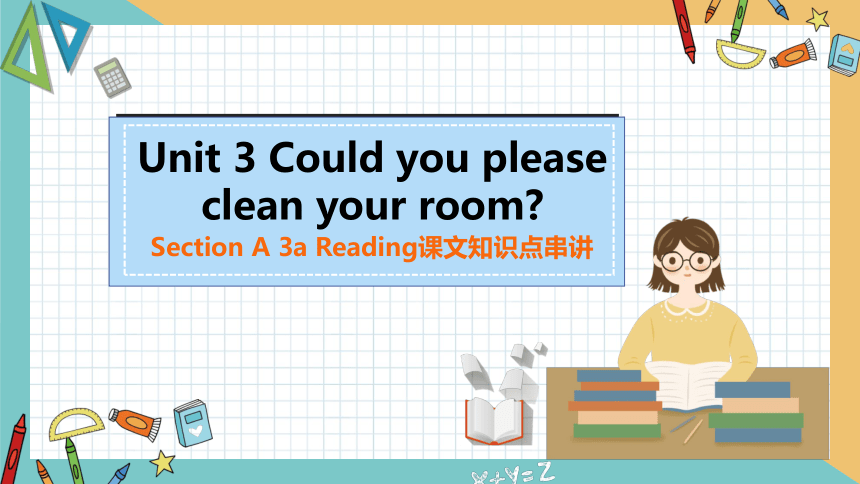 | |
| 格式 | zip | ||
| 文件大小 | 1.1MB | ||
| 资源类型 | 教案 | ||
| 版本资源 | 人教新目标(Go for it)版 | ||
| 科目 | 英语 | ||
| 更新时间 | 2022-02-03 13:15:37 | ||
图片预览

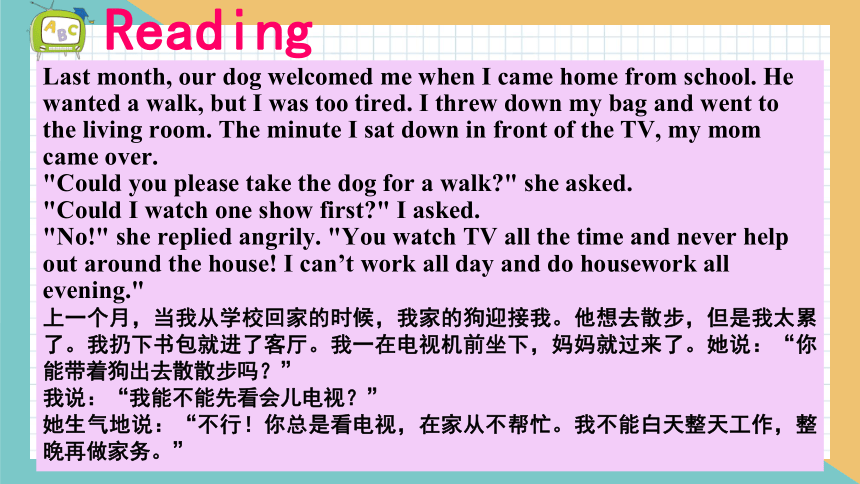
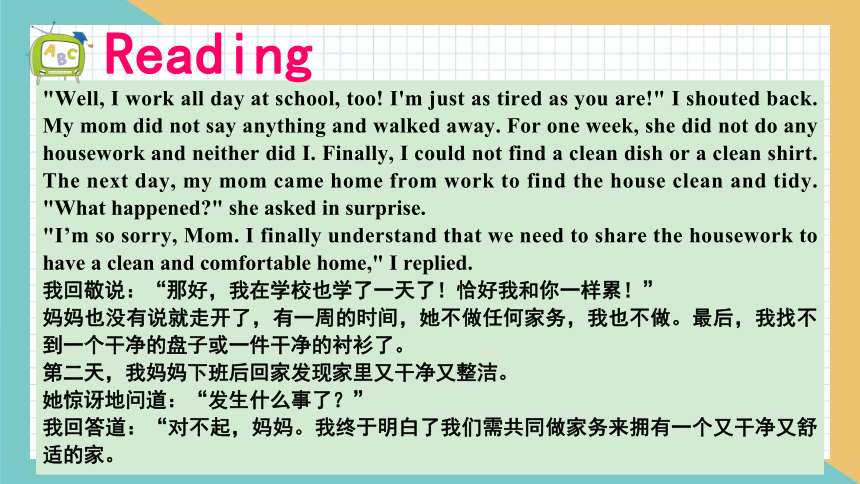
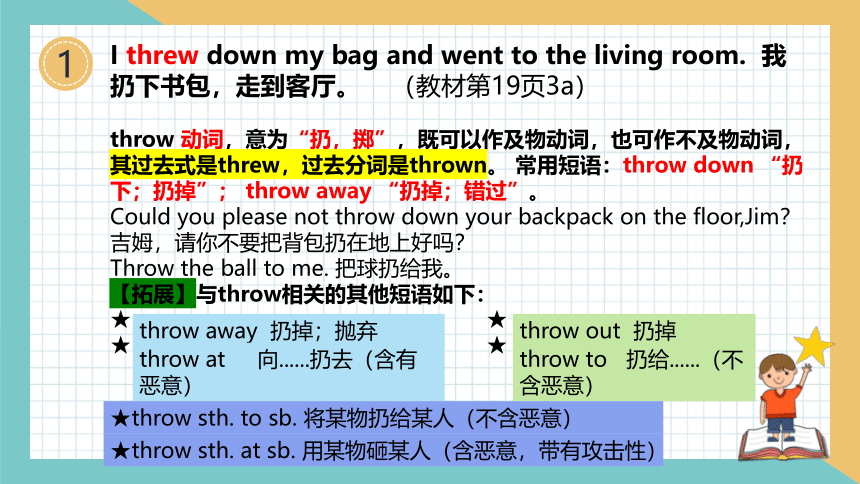
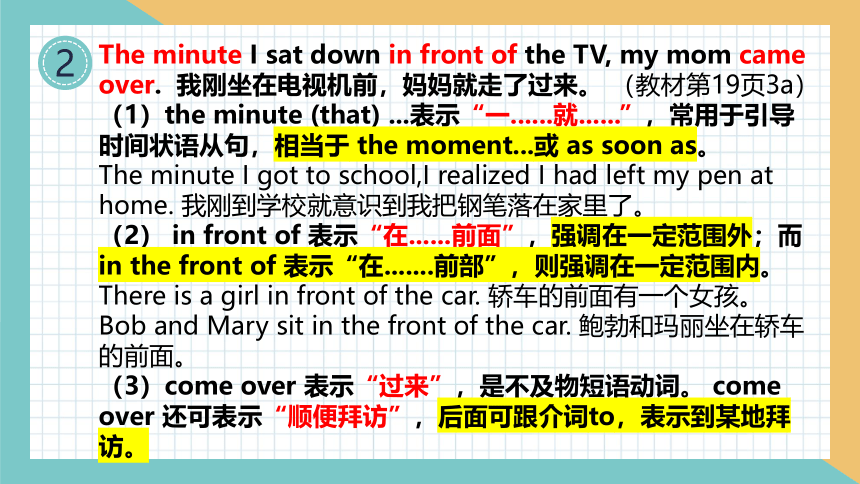
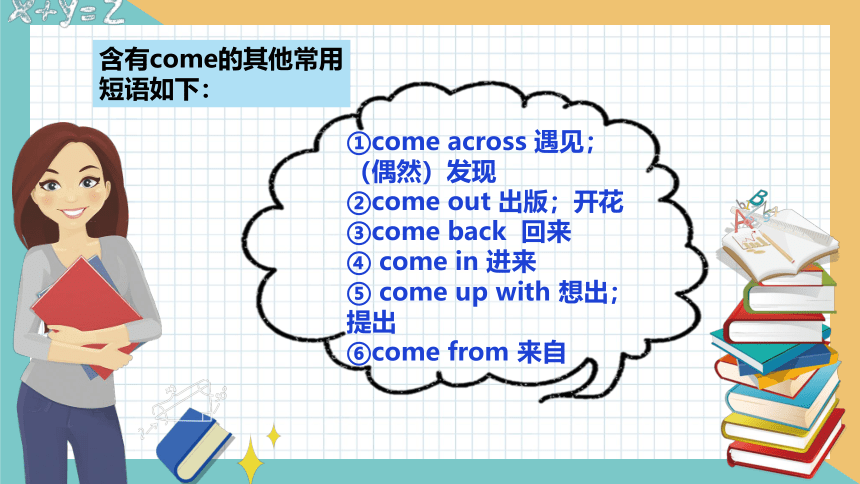
文档简介
(共12张PPT)
Unit 3 Could you please clean your room
Section A 3a Reading课文知识点串讲
Last month, our dog welcomed me when I came home from school. He wanted a walk, but I was too tired. I threw down my bag and went to the living room. The minute I sat down in front of the TV, my mom came over.
"Could you please take the dog for a walk " she asked.
"Could I watch one show first " I asked.
"No!" she replied angrily. "You watch TV all the time and never help out around the house! I can’t work all day and do housework all evening."
上一个月,当我从学校回家的时候,我家的狗迎接我。他想去散步,但是我太累了。我扔下书包就进了客厅。我一在电视机前坐下,妈妈就过来了。她说:“你能带着狗出去散散步吗?”
我说:“我能不能先看会儿电视?”
她生气地说:“不行!你总是看电视,在家从不帮忙。我不能白天整天工作,整晚再做家务。”
Reading
"Well, I work all day at school, too! I'm just as tired as you are!" I shouted back. My mom did not say anything and walked away. For one week, she did not do any housework and neither did I. Finally, I could not find a clean dish or a clean shirt. The next day, my mom came home from work to find the house clean and tidy. "What happened " she asked in surprise.
"I’m so sorry, Mom. I finally understand that we need to share the housework to have a clean and comfortable home," I replied.
我回敬说:“那好,我在学校也学了一天了!恰好我和你一样累!”
妈妈也没有说就走开了,有一周的时间,她不做任何家务,我也不做。最后,我找不到一个干净的盘子或一件干净的衬衫了。
第二天,我妈妈下班后回家发现家里又干净又整洁。
她惊讶地问道:“发生什么事了?”
我回答道:“对不起,妈妈。我终于明白了我们需共同做家务来拥有一个又干净又舒适的家。
Reading
1
I threw down my bag and went to the living room. 我扔下书包,走到客厅。 (教材第19页3a)
throw 动词,意为“扔,掷”,既可以作及物动词,也可作不及物动词,其过去式是threw,过去分词是thrown。 常用短语:throw down “扔下;扔掉”; throw away “扔掉;错过”。
Could you please not throw down your backpack on the floor,Jim?吉姆,请你不要把背包扔在地上好吗?
Throw the ball to me. 把球扔给我。
【拓展】与throw相关的其他短语如下:
★ ★
★ ★
throw away 扔掉;抛弃
throw out 扔掉
throw at 向......扔去(含有恶意)
throw to 扔给......(不含恶意)
★throw sth. to sb. 将某物扔给某人(不含恶意)
★throw sth. at sb. 用某物砸某人(含恶意,带有攻击性)
2
The minute I sat down in front of the TV, my mom came over. 我刚坐在电视机前,妈妈就走了过来。 (教材第19页3a)
(1)the minute (that) ...表示“一......就......”,常用于引导时间状语从句,相当于 the moment...或 as soon as。
The minute I got to school,I realized I had left my pen at home. 我刚到学校就意识到我把钢笔落在家里了。
(2) in front of 表示“在......前面”,强调在一定范围外;而in the front of 表示“在.......前部”,则强调在一定范围内。
There is a girl in front of the car. 轿车的前面有一个女孩。
Bob and Mary sit in the front of the car. 鲍勃和玛丽坐在轿车的前面。
(3)come over 表示“过来”,是不及物短语动词。 come over 还可表示“顺便拜访”,后面可跟介词to,表示到某地拜访。
①come across 遇见;(偶然)发现
②come out 出版;开花
③come back 回来
④ come in 进来
⑤ come up with 想出;提出
⑥come from 来自
含有come的其他常用短语如下:
3
You watch TV all the time and never help out around the house ! 你总是看电视,在家里从不帮忙! (教材第19页3a)
all the time 意为“频繁;反复”,强调某动作在某时间段内一直进行或反复发生,在句中做状语,通常位于句末。
No one can be a winner all the time.
没有人能一直是赢家。
I’m tired of doing the same thing all the time. Let’s try something new!
我厌倦了一直做相同的事情。让我们尝试一些新东西吧!
【拓展】
(1)always 也意为“总是”,常位于实义动词之前,助动词、情态动词或be动词之后。
She always gets the first place in the English exams.
她总是在英语考试中得第一名。
He can always makes me laugh when I feel sad.
我难过的时候,他总是能把我逗笑。
(2)与time相关的其他常用短语如下:
in time 及时
on time 按时
at the same time
同时
at times/from time to time 有时;偶尔
by the time ......到......时候;到......之前
for the first time
第一次
4
I’m just as tired as you are ! 我和你一样累!(教材第19页3a)
as...as... 意为“与......一样......”,用于同级比较,两个as中间用形容词或副词原级。
The tree is as tall as the building. 这棵树和那栋楼一样高。
He runs as quickly as his father. 他跑得和他父亲一样快。
【拓展】
as...as...的否定形式 not as/so...as..., 意为“不如......那样......”。
She doesn’t study so/as hard as her brother. 她不如她的哥哥学习努力。
Lesson 6 is not as/ so difficult as Lesson 7.
第六课不如第七课难。
5
For one week,she did not do any housework and neither did I. 有一个星期,她没做任何家务,我也没做。(教材第19页3a)
neither 此处用作副词,意为“也不”。neither did I 是倒装结构,相当于 me neither。 “neither+助动词/情态动词/系动词+主语”结构,表示前面叙述的否定情况也适合另外的人或物。当前面叙述的肯定情况也适用于后者时,要用“so+助动词/情态动词/系动词+主语”结构。
【拓展】
neither 的其他用法如下:
(1)neither 还可做代词,意为“(两者)都不”。其反义词为both,意为“两者都”。“neither of+复数名词/代词”结构做主语时,谓语动词用单复数形式都可以。
7
“What happened ” she asked in surprise. “发生什么事了?” 她吃惊地问道。 (教材第19页3a)
in surprise 意为“惊讶地;吃惊地”,在句中做状语,表示状态。 此处surprise作名词,意为”惊奇;惊讶“,其常用短语还有 to one’s surprise,意为”使......惊讶的是;出乎......的意料“。
She looked up in surprise. 她惊讶地抬起头。
【拓展】
surprise 作动词,意为“使惊讶”。
常见的相关词如下:
surprised adj. 惊奇的;惊讶的
surprising adj. 令人吃惊的
修饰人
修饰物
Thank you~
Unit 3 Could you please clean your room
Section A 3a Reading课文知识点串讲
Last month, our dog welcomed me when I came home from school. He wanted a walk, but I was too tired. I threw down my bag and went to the living room. The minute I sat down in front of the TV, my mom came over.
"Could you please take the dog for a walk " she asked.
"Could I watch one show first " I asked.
"No!" she replied angrily. "You watch TV all the time and never help out around the house! I can’t work all day and do housework all evening."
上一个月,当我从学校回家的时候,我家的狗迎接我。他想去散步,但是我太累了。我扔下书包就进了客厅。我一在电视机前坐下,妈妈就过来了。她说:“你能带着狗出去散散步吗?”
我说:“我能不能先看会儿电视?”
她生气地说:“不行!你总是看电视,在家从不帮忙。我不能白天整天工作,整晚再做家务。”
Reading
"Well, I work all day at school, too! I'm just as tired as you are!" I shouted back. My mom did not say anything and walked away. For one week, she did not do any housework and neither did I. Finally, I could not find a clean dish or a clean shirt. The next day, my mom came home from work to find the house clean and tidy. "What happened " she asked in surprise.
"I’m so sorry, Mom. I finally understand that we need to share the housework to have a clean and comfortable home," I replied.
我回敬说:“那好,我在学校也学了一天了!恰好我和你一样累!”
妈妈也没有说就走开了,有一周的时间,她不做任何家务,我也不做。最后,我找不到一个干净的盘子或一件干净的衬衫了。
第二天,我妈妈下班后回家发现家里又干净又整洁。
她惊讶地问道:“发生什么事了?”
我回答道:“对不起,妈妈。我终于明白了我们需共同做家务来拥有一个又干净又舒适的家。
Reading
1
I threw down my bag and went to the living room. 我扔下书包,走到客厅。 (教材第19页3a)
throw 动词,意为“扔,掷”,既可以作及物动词,也可作不及物动词,其过去式是threw,过去分词是thrown。 常用短语:throw down “扔下;扔掉”; throw away “扔掉;错过”。
Could you please not throw down your backpack on the floor,Jim?吉姆,请你不要把背包扔在地上好吗?
Throw the ball to me. 把球扔给我。
【拓展】与throw相关的其他短语如下:
★ ★
★ ★
throw away 扔掉;抛弃
throw out 扔掉
throw at 向......扔去(含有恶意)
throw to 扔给......(不含恶意)
★throw sth. to sb. 将某物扔给某人(不含恶意)
★throw sth. at sb. 用某物砸某人(含恶意,带有攻击性)
2
The minute I sat down in front of the TV, my mom came over. 我刚坐在电视机前,妈妈就走了过来。 (教材第19页3a)
(1)the minute (that) ...表示“一......就......”,常用于引导时间状语从句,相当于 the moment...或 as soon as。
The minute I got to school,I realized I had left my pen at home. 我刚到学校就意识到我把钢笔落在家里了。
(2) in front of 表示“在......前面”,强调在一定范围外;而in the front of 表示“在.......前部”,则强调在一定范围内。
There is a girl in front of the car. 轿车的前面有一个女孩。
Bob and Mary sit in the front of the car. 鲍勃和玛丽坐在轿车的前面。
(3)come over 表示“过来”,是不及物短语动词。 come over 还可表示“顺便拜访”,后面可跟介词to,表示到某地拜访。
①come across 遇见;(偶然)发现
②come out 出版;开花
③come back 回来
④ come in 进来
⑤ come up with 想出;提出
⑥come from 来自
含有come的其他常用短语如下:
3
You watch TV all the time and never help out around the house ! 你总是看电视,在家里从不帮忙! (教材第19页3a)
all the time 意为“频繁;反复”,强调某动作在某时间段内一直进行或反复发生,在句中做状语,通常位于句末。
No one can be a winner all the time.
没有人能一直是赢家。
I’m tired of doing the same thing all the time. Let’s try something new!
我厌倦了一直做相同的事情。让我们尝试一些新东西吧!
【拓展】
(1)always 也意为“总是”,常位于实义动词之前,助动词、情态动词或be动词之后。
She always gets the first place in the English exams.
她总是在英语考试中得第一名。
He can always makes me laugh when I feel sad.
我难过的时候,他总是能把我逗笑。
(2)与time相关的其他常用短语如下:
in time 及时
on time 按时
at the same time
同时
at times/from time to time 有时;偶尔
by the time ......到......时候;到......之前
for the first time
第一次
4
I’m just as tired as you are ! 我和你一样累!(教材第19页3a)
as...as... 意为“与......一样......”,用于同级比较,两个as中间用形容词或副词原级。
The tree is as tall as the building. 这棵树和那栋楼一样高。
He runs as quickly as his father. 他跑得和他父亲一样快。
【拓展】
as...as...的否定形式 not as/so...as..., 意为“不如......那样......”。
She doesn’t study so/as hard as her brother. 她不如她的哥哥学习努力。
Lesson 6 is not as/ so difficult as Lesson 7.
第六课不如第七课难。
5
For one week,she did not do any housework and neither did I. 有一个星期,她没做任何家务,我也没做。(教材第19页3a)
neither 此处用作副词,意为“也不”。neither did I 是倒装结构,相当于 me neither。 “neither+助动词/情态动词/系动词+主语”结构,表示前面叙述的否定情况也适合另外的人或物。当前面叙述的肯定情况也适用于后者时,要用“so+助动词/情态动词/系动词+主语”结构。
【拓展】
neither 的其他用法如下:
(1)neither 还可做代词,意为“(两者)都不”。其反义词为both,意为“两者都”。“neither of+复数名词/代词”结构做主语时,谓语动词用单复数形式都可以。
7
“What happened ” she asked in surprise. “发生什么事了?” 她吃惊地问道。 (教材第19页3a)
in surprise 意为“惊讶地;吃惊地”,在句中做状语,表示状态。 此处surprise作名词,意为”惊奇;惊讶“,其常用短语还有 to one’s surprise,意为”使......惊讶的是;出乎......的意料“。
She looked up in surprise. 她惊讶地抬起头。
【拓展】
surprise 作动词,意为“使惊讶”。
常见的相关词如下:
surprised adj. 惊奇的;惊讶的
surprising adj. 令人吃惊的
修饰人
修饰物
Thank you~
同课章节目录
- Unit 1 What's the matter?
- Section A
- Section B
- Unit 2 I'll help to clean up the city parks.
- Section A
- Section B
- Unit 3 Could you please clean your room?
- Section A
- Section B
- Unit 4 Why don't you talk to your parents?
- Section A
- Section B
- Unit 5 What were you doing when the rainstorm came
- Section A
- Section B
- Review of Units 1-5
- Unit 6 An old man tried to move the mountains.
- Section A
- Section B
- Unit 7 What's the highest mountain in the world?
- Section A
- Section B
- Unit 8 Have you read Treasure Island yet?
- Section A
- Section B
- Unit 9 Have you ever been to a museum?
- Section A
- Section B
- Unit 10 I've had this bike for three years.
- Section A
- Section B
